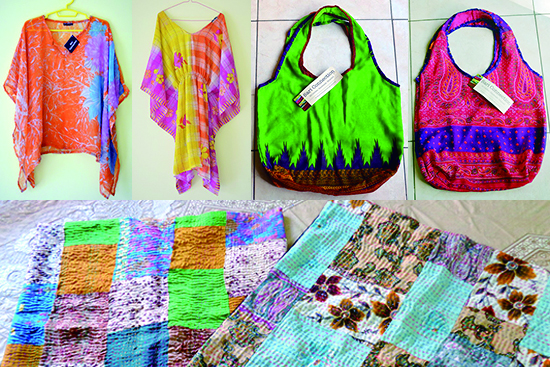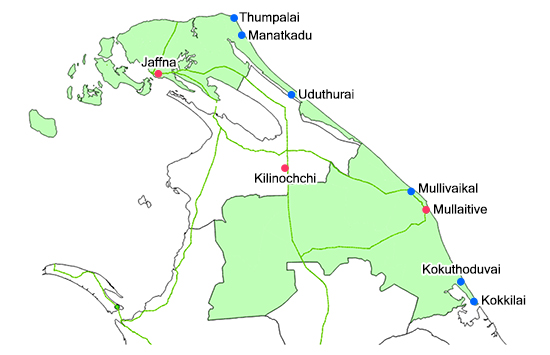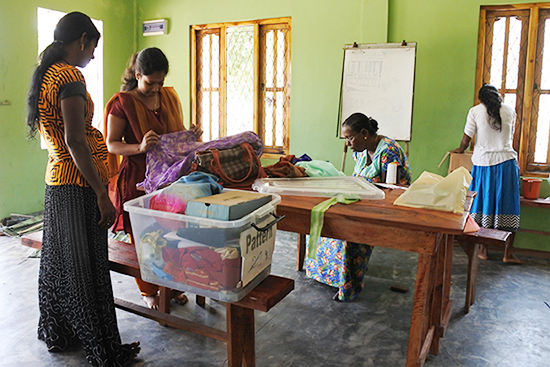
PARCIC launched the ‘Recycle Sari Project’ in 2012 aiming to support women headed families in war-affected Northern Sri Lanka.
The trained seamstresses in Jaffna and Mullaitivu upcycle donated saris to create unique designs that are sold in Japan and Sri Lanka. The proceeds are distributed back to the original seamstresses in the North to support their families. By mid 2015 the project provides economic benefits to over 80 women and their families, mostly female-headed households, as a supportive livelihood.
‘Sari Connection’ the brand name for the products made through this initiative is essentially unique due to the nature of production. Used saris serve as a material for sewing and since the donated saris are of varying textures and colors, it is difficult to reproduce a particular combination of design and material. Each piece is carefully handcrafted after cleaning and pressing these used saris to create an absolutely unique product range. Reviving old materials by upcycling what otherwise would be kept at home and not worn any longer is an attractive feature of this project.
Further, the networking involved in the production process – from donations of saris to creating designs to sales – is made up of women from different walks of life as well as geographical and ethnic backgrounds. Through working together and expanding this network, PARCIC envisions the project will be a bridge for peace and harmony among communities through economic, social and cultural cooperation.


I’m living in Thumpalai, Jaffna. My husband was working as a fishing labor, but due to the less catch of fish now he is working as a mason, which doesn’t bring us stable income. At my home, I do small chicken poultry farm, from which I earn Rs.1,000 a month. I have five children. Three of them are students. I learnt sewing earlier, but there hasn’t been a chance to use the skill because I didn’t have a sewing machine.
After joining this project, I participated trainings given by Japanese and Sri Lankan teachers. They taught us new designs and techniques. I also received a sewing machine through the project. It was encouraging for me to continue the works, and I could try beautiful items through the trainings. Now I’m spending part of my time for this project and making fashionable items, which makes me happy.
The earning from the project is one of my major income sources now. Using this opportunity, my sons are going special English classes. I want to offer good education to my children, which I couldn’t get in my childhood because of poverty. I’m happy that I can spend more to the education and send my kids to the classes now. When making clothes, I enjoy the work and feel delight to finish a piece every time.
 Women in Thumpalai
Women in Thumpalai
I’m living in Uduthurai, Jaffna. I have three children and all of them are school students. Our village has been affected by the tsunami and the war. During the war, we displaced to Vanni and faced a lot of difficulties. Moreover, my husband has been missing since 2010. He left from my village to go to Australia by boat with his friends. After that until now, I haven’t received any news about him. My family has been suffering from unstable income after that. Now I am the only one looking after my family. I’m doing fishing labor works, but due to the less catch of fish, I can’t get regular income.
After joining this project, I got sewing machine and trainings. Now I’m stitching clothes for the sari project as well as private orders from the neighbors. With the income from stitching, I manage my family needs. It’s a good opportunity for us, because the job opportunity is very limited in these villages. It’s also good that we can work at our home, as it’s difficult to work outside for mothers from women headed families. I’m happy to make more items, take more orders, as well as to learn more techniques.
 Women in Uduthurai
Women in Uduthurai
I am 36 years old, living in Kokkilai, Mullaitivu. I joined the sari project in May 2015. Before that, I did not know how to stitch properly. The 6 months of training provided by PARCIC boosted my confidence in sewing. I am now stitching skirts and table runners.
I lost my husband, as well as three of my siblings, during the war. I resettled from a camp to Kokkilai in 2010, and am currently living with my parents and 12 year-old son. I depended on my parents before joining this project, but now am able to get income through the sari project. I planned to spend this income for my son’s study when I joined, and with the earnings I started to send my son to private classes. I want to learn more sewing techniques and become a tailor, so that I can earn more for my son. I am very happy to be a member of the sari project.
 Women in Kokkilai
Women in Kokkilai
You can Donate a sari and help make a difference!
Call us on
Check the shop list on our Facebook page.
![]()
Newsletters updating the project progress.
PDF version is avaiable here
sariconnection@parcic.org
+94 (0) 711 918 252